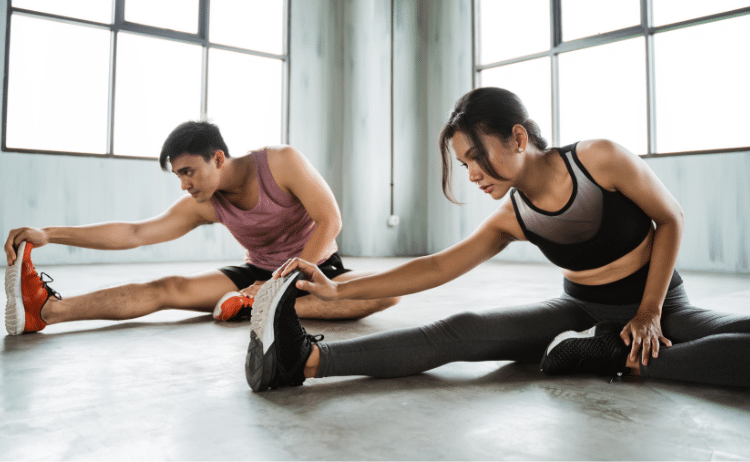The Ultimate Guide to the Calf Stretch: Benefits, Techniques, and Tips
Stretching is an essential component of a balanced fitness routine, and one stretch that often deserves more attention is the calf stretch. This article will guide you through the benefits of calf stretches, various techniques to perform them correctly, and some practical tips to enhance your stretching routine. Understanding and incorporating calf stretches into your exercise regimen can help improve flexibility, prevent injury, and enhance overall performance.
Understanding the Calf Stretch
What Is a Calf Stretch?
A calf stretch is a simple yet effective exercise designed to lengthen and loosen the muscles in your calf. The calf is composed of two primary muscles: the gastrocnemius and the soleus. The gastrocnemius is the larger muscle that runs down the back of your leg and is responsible for bending the knee and pointing the toes. The soleus lies underneath the gastrocnemius and plays a crucial role in stabilizing the ankle and foot.
Calf stretches target these muscles to increase their flexibility and relieve tension. Regular stretching can help alleviate muscle tightness, improve range of motion, and contribute to better overall lower-body health.
Why Is the Calf Stretch Important?
The importance of the calf stretch cannot be overstated. Here are several key benefits:
- Improved Flexibility: Regular stretching can increase the flexibility of the calf muscles, which can enhance your ability to perform various physical activities.
- Reduced Muscle Tension: Stretching helps to release tightness in the calf muscles, which can alleviate discomfort and reduce the risk of cramps and strains.
- Enhanced Performance: Flexible calf muscles contribute to better athletic performance, particularly in activities that involve running, jumping, and quick changes of direction.
- Injury Prevention: By maintaining the flexibility and health of your calf muscles, you can reduce the risk of injuries related to muscle strain and overuse.
- Better Posture and Balance: Stretching the calves can contribute to improved posture and balance, which are essential for overall stability and coordination.
Techniques for Effective Calf Stretches
Basic Standing Calf Stretch
One of the most straightforward and effective calf stretches is the standing calf stretch. Here’s how to do it:
- Find a Wall: Stand facing a wall, about an arm’s length away. Place your hands on the wall for support.
- Position Your Feet: Step one foot back, keeping the heel on the ground and the toes pointing forward. The other foot should remain closer to the wall.
- Bend Your Front Knee: Gently bend your front knee while keeping your back leg straight. You should feel a stretch in the calf of the back leg.
- Hold the Stretch: Maintain this position for 20-30 seconds, ensuring you feel a comfortable stretch but not pain.
- Switch Legs: Repeat the stretch on the other side.
Seated Calf Stretch
The seated calf stretch is another effective method, especially if you have limited mobility. Follow these steps:
- Sit on the Floor: Sit on the floor with your legs extended in front of you.
- Loop a Towel: Take a towel or resistance band and loop it around the ball of one foot.
- Gently Pull: While keeping your knee straight, gently pull the towel towards you. You should feel a stretch along the back of your calf.
- Hold the Stretch: Maintain the stretch for 20-30 seconds.
- Repeat: Switch to the other leg and repeat the stretch.
Wall Calf Stretch
For a more intense stretch, the wall calf stretch can be very effective:
- Find a Wall or Post: Stand facing a wall or a sturdy post.
- Position Your Foot: Place the ball of one foot against the wall, with the heel on the ground and the toes pointing upward.
- Lean Forward: Gently lean your body forward, bending the knee of your standing leg while keeping the leg with the foot against the wall straight.
- Hold the Stretch: Hold this position for 20-30 seconds.
- Switch Feet: Repeat on the other side.
Tips for Maximizing Your Calf Stretch Routine
Warm Up Before Stretching
It’s essential to warm up your muscles before performing any stretches. Engage in light aerobic activities, such as walking or jogging, for a few minutes to increase blood flow to your muscles and prepare them for stretching.
Stretch Regularly
Consistency is key to achieving and maintaining flexibility. Aim to include calf stretches in your routine at least 2-3 times a week to reap the full benefits.
Avoid Overstretching
While it’s important to stretch your muscles, avoid overstretching, which can lead to injury. Stretch until you feel a gentle pull, not pain. If you experience any sharp or severe pain, stop the stretch immediately and consult a healthcare professional.
Incorporate Variations
To prevent your routine from becoming monotonous, incorporate different calf stretching techniques and variations. This can help target different areas of the calf muscles and keep your stretching routine engaging.
Use Proper Technique
Ensure you are using proper form during your stretches to maximize their effectiveness and prevent injury. If you’re unsure about your technique, consider seeking guidance from a fitness professional.
Combine with Strength Training
Incorporating strength training exercises for the calves can complement your stretching routine. Exercises such as calf raises can help build strength and endurance in the calf muscles, leading to better overall muscle health.
Conclusion
The calf stretch is a valuable addition to any fitness routine, offering a range of benefits from improved flexibility to enhanced athletic performance. By incorporating various stretching techniques and following practical tips, you can effectively target and relieve tension in your calf muscles. Remember to stretch regularly, use proper technique, and combine stretching with strength training for optimal results. Whether you’re an athlete or someone looking to maintain overall muscle health, the calf stretch can play a crucial role in your fitness journey.

